Conquering Spaces!
Bauhaus Agents Annual Conference #3
Conquering spaces in museum outreach practice, linking the museum to its visitors' everyday experiences, mainly signifies finding and using interfaces and points of contact outside the classical museum programme: in the museum foyer, in the city, and in digital space. From 20th to 22nd June 2019 in Weimar, Germany, the Bauhaus Agents' Annual Conference #3 "Conquering Spaces" illustrated this motto in inspiring workshops, keynote lectures and numerous examples from international practice.
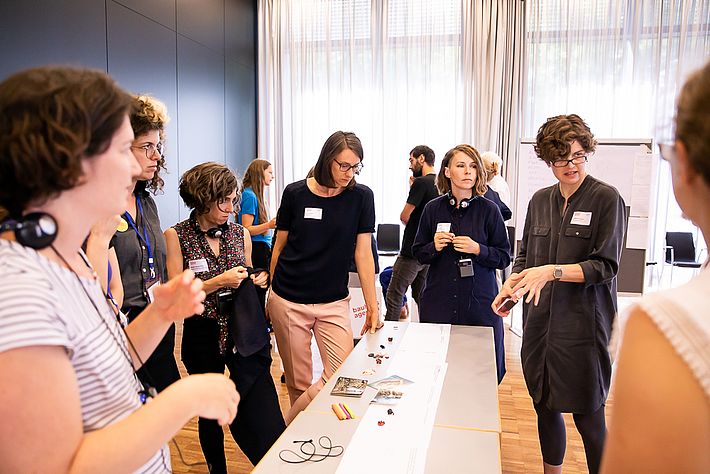
We have been able, with the Bauhaus Agents' Annual Conference, to provide an important impulse for discourse on new methods of outreach and museum design, both in terms of content and methodology.
Silke Feldhoff
[Translate to English:] Überschrift
What does the Haus am Horn sound like as a poem? Can (and may) you also play badminton or relax in the Bauhaus Museum? And how do you tell a love story with dough and coloured paper? Right at the beginning of the conference things became practical and concrete: "Aesthetic action and one's own design are special approaches to the Bauhaus and to our designed reality of life," to quote the conference programme. On the first day of the conference, the Bauhaus agents demonstrated–in three workshops in the Haus am Horn and in the Weimar Bauhaus Museum together with pupils and teachers, designers and other outreach specialists–what insightful practice beyond the scientific research methods traditionally anchored in museums might look like.
On the following day, the results of the workshop formed a prelude to the public part of the conference, which combined the practical experience from the project work with an international Pecha Kucha evening, and keynote lectures with current international discourse on museums and education. Around 100 guests accepted the invitation to talk about their experiences in the Weimarhalle: programme participants and makers as well as independent and institutionally anchored outreach and communication experts from institutions such as the White City Center Tel Aviv, the Historisches Museum Frankfurt, the ZKM Karlsruhe, the Landesverband Museumspädagogik Ost, the Goethe Institute Athens, the Fondation Beyeler, or Asociatia 37 from Bucharest.
Collective Design as an Analogue-Digital Love Story
The animated film "Veronika und Mark" celebrated its premiere at the opening of the conference. It was presented by students of the Liborius Gymnasium in Dessau, who had tested design as a collective experience in the workshop "BAUHAUS RELOADED": in digital space using analogue tools and a good story. Together with Jörn Hintzer from Datenstrudel, a specialist in cross-media moving images, and the Dessau Bauhaus agents Tabea Kiessling and Anne Schneider, the pupils used simple materials such as coloured paper, plasticine, postcards and a rope to develop a story in which the analogue and the digital were merged. During the creation process, they explored the possibilities of collaborative action in design processes and found simple and effective images for a story that could originate from their everyday lives–the love story between Veronika and Mark.
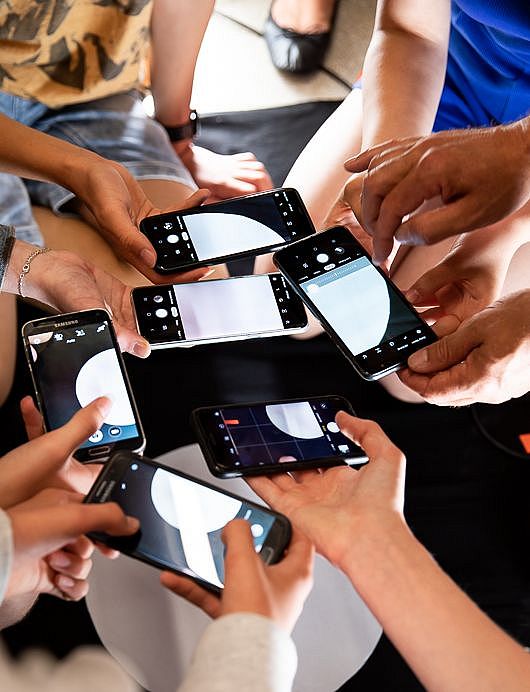
The Museum as (your) place in a live experiment
"The Bauhaus agents are blind spot hunters (...) and carry the visitors' ideas into the museums," was how the conference programme described the task profile of the Bauhaus agents. The workshop "Open - and now? The museum as (your) place" took on such blind spots and asked: What distinguishes the museum from its exhibitions? What do we want to do here? How does the museum become a public but also a personal place? Weimar Bauhaus agents Maxie Götze, Valerie Stephani and Johannes Siebler pursued these questions together with Sabine Faller and Julia Tscherbakova from the ZKM Karlsruhe and a group of young people.They took advantage of the exhibitions already opened in the Bauhaus Museum and the Neues Museum for their live experiment: the young people invited museum visitors to join in unusual museum activities and so developed ideas for "their" museum space. "Museums are not only places of collecting, but also places of gathering," Sabine Faller of the ZKM Karlsruhe emphasized in respect to this approach of playfully testing alternative uses for museum space. Table tennis or badminton were played, paper planes folded, and a picnic was held in the corridor. But some people just wanted to rest–"Museums also make people tired and need more space for rest and relaxation," was one of the findings made by the pupils in their live experiment.
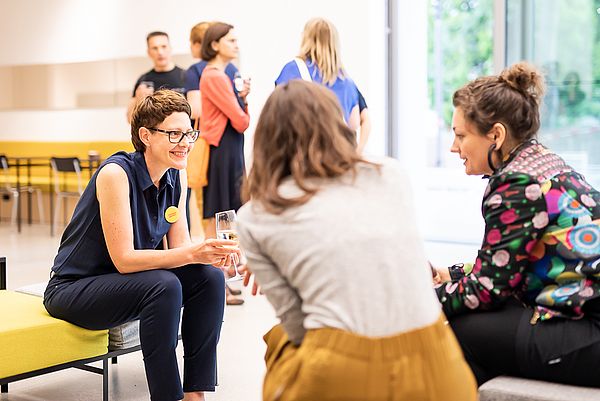
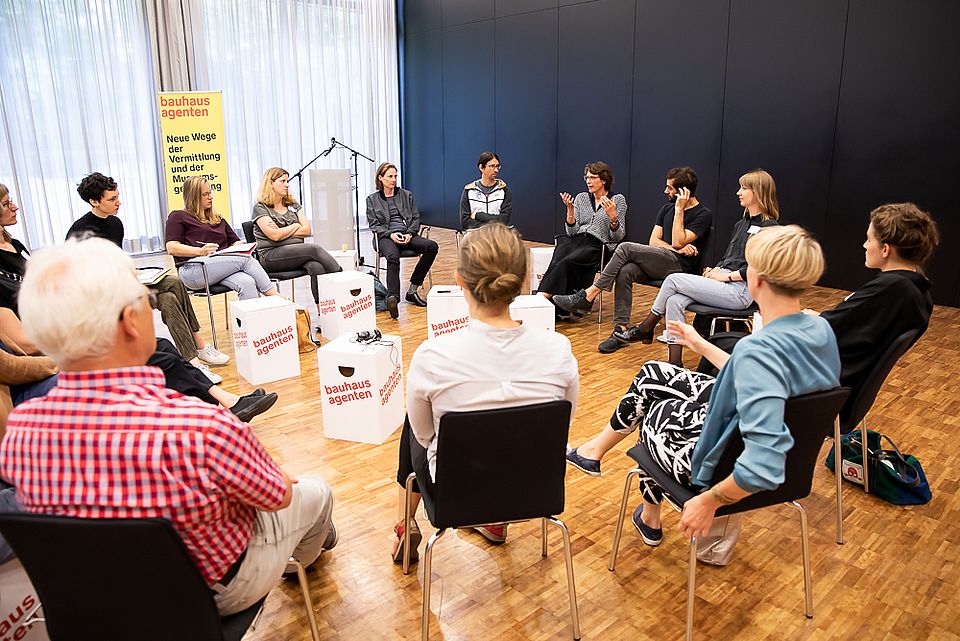
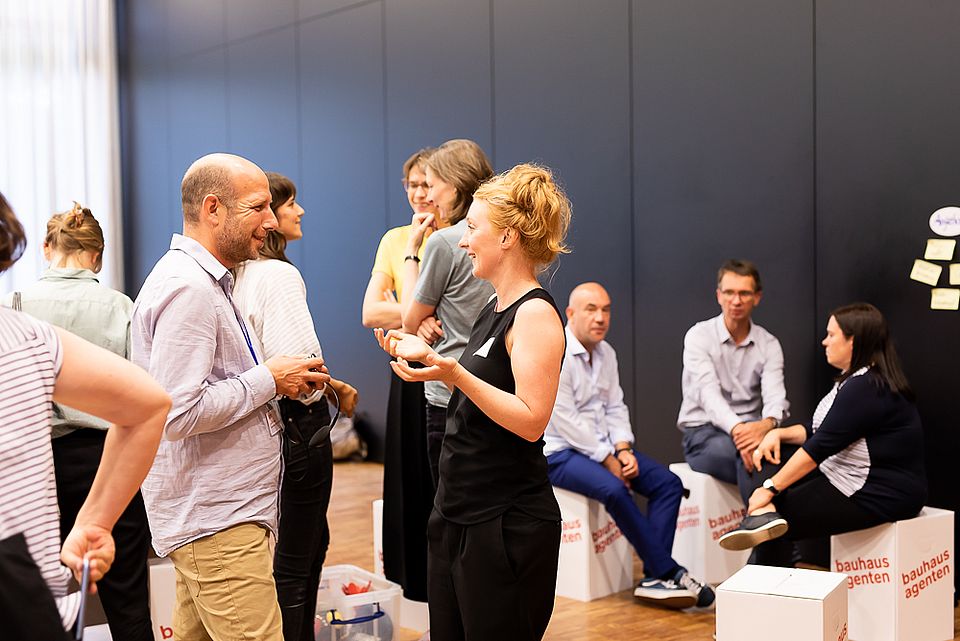
Architectural experience with house poems and fake memories
The workshop "Experiencing Architecture", which was developed jointly by Friederike Holländer from the Berlin Bauhaus Agents Program and numerous art educators from the Berlin Bauhaus Archive and the White City Center Tel Aviv, sought alternative approaches to architecture and cultural heritage in a modern architectural icon–the "Haus am Horn". The workshop team presented six jointly developed proposals with additional practical instructions for activity at the conference. For example, "Fake Memories" poses the question of what it would have been like to be a resident of the legendary Haus am Horn, and encourages the creation of the illusion of personal memories with reconstructed scenes from historical photographs. Group actions such as "Drawing with both hands" or "Drawing in circles", in which various actors in the individual rooms continue to draw on a sketch, open up new architectural experiences, as does the idea of writing a poem for the Haus am Horn.
Pecha Kucha: International strategies of "conquering space"
After the presentations of specific work on site, the focus during the evening was extended to include international experiences: A Pecha Kucha evening made it possible to take a closer look at projects from Switzerland, Greece, Romania and Israel.
Flavia Mayer from the Fondation Beyeler (Riehen, Canton Basel-City) spoke about experiences of peer-to-peer art teaching with school pupils at her institution. Dimitris Soudias, head of the Information and Library Department at the Goethe Institute Athens, presented the modular BAUHAUS DIY communication kit, which is based on the principle of "commoning", the use of collectively available resources. Irina Bălan of Asociatia 37, an NGO working for the protection of cultural heritage in Romania, gave insights into the project "Bauhaus Circle. Contemporary PLAY". It makes use of low-threshold pre-course exercises à la Bauhaus and enables children to help shape their learning environment–a participative approach, similar to the "Learning Space Research" initiated by the Berlin Bauhaus agents and the furniture construction project at the Bauhaus Dessau. At the end of a second inspiring conference day, Maayan Mozes Platnic, performance and public art artist in Tel Aviv, showed how she had developed an "Urban Choreography" with children starting out from observations of the city.
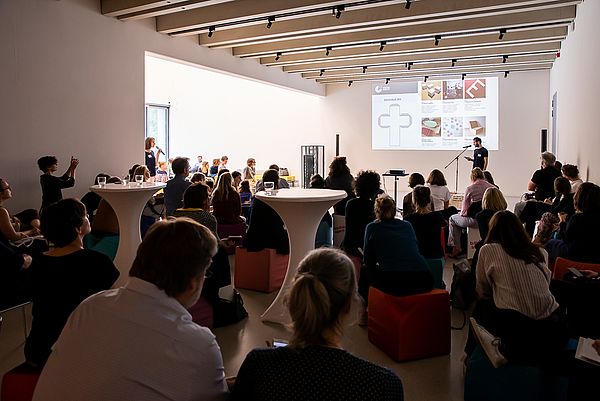
Impulses: Play, participation and everyday experience
On the third day of the conference, the three speakers of the keynote lectures took over, embedding the many practical examples and impressions into current scientific discourse. Business information scientist Dr. Thomas Voit encouraged playful learning in the spirit of the Bauhaus and asked in his keynote: "How do games motivate us?" Urban researcher Katharina Böttger recommended "Shared expertise in museum work!" and referred to the city laboratory of the Historisches Museum Frankfurt, which enables citizens to participate. Turit Fröbe, who is constantly looking for new, everyday approaches to architectural communication with her "Stadtdenkerei" and publications such as "Bausünden zum Abreißen" (Building Sins for Demolition), concluded with a passionate plea to convey a building culture beyond critical didactic finger pointing: one that relies on everyday experience and perception.
"The focus of the annual conference was on practice, and its goal was expert exchange across professional, institutional and national borders. The concept was a great success, there were fascinating insights into concepts and methods, inspiring discussions and, in all the projects presented, transfer possibilities to contexts entirely different from the originals. We have been able, with the Bauhaus Agents' Annual Conference, to provide an important impulse for discourse on new methods of outreach and museum design, both in terms of content and methodology," programme coordinator Silke Feldhoff commented in her summary at the end of the three conference days. We are looking forward to a continuation in 2020. The final conference of the Bauhaus Agents Programme will take place in the Bauhaus Museum Dessau from 17th to 19th June 2020.
(FE)